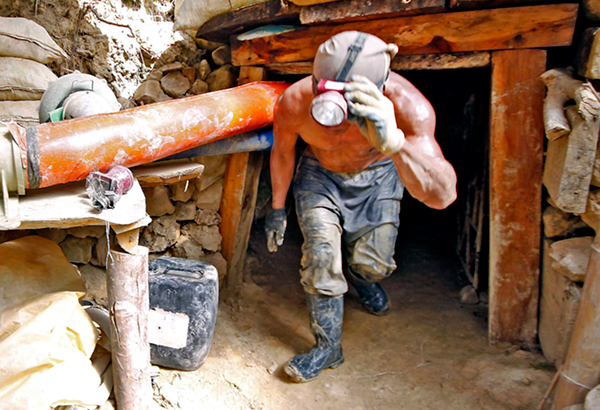Commentary: Towards sustainable mining and economic recovery

The COVID-19 pandemic has had devastating effects on the economy. A recent Social Weather Stations (SWS) survey showed that unemployment reached a record-high of 45.5% in July of this year. The SWS also found that 2 in 5 Filipinos believe that the country's economy will only become worse over the next year.
The figures that the Department of Finance (DOF) presented to the House of Representatives during the 2021 budget briefings the other week support this gloomy outlook. During the briefing, DOF Secretary Carlos Dominguez said that in the first seven months of this year, the government had suffered a total revenue fall of 6.8% compared to the same period in 2019. And that, even with "emerging" tax revenues projected at P2.5 trillion, the government will be ending the year with a budget deficit of about P1.8 trillion.
Dominguez said that they would be bridging the budget gap with additional borrowing. But he also emphasized some legislative priorities that would support the country's recovery.
The list of bills included existing legislative priorities, like the Corporate Recovery and Tax Incentives for Enterprises Act (CREATE) bill and Financial Institutions Strategic Transfer (FIST). Most notable in the list of tax reform priorities is the new Mining Tax Regime.
The Mining Tax Regime bill, which seeks to increase the economic benefits the government generates from the mining industry, was approved by the House Committee on Natural Resources earlier this year but has yet to be scheduled for plenary debates. The passage of the measure is eyed as the first step to the lifting of the moratorium on new mining projects that has been in effect since 2012.
By pushing for the creation of a new Mining Tax Regime, government is looking to tap into the mining industry and the country's massive mineral resources to attract investment, create jobs, and generate much-needed revenue to support its pandemic response program and the country's post-pandemic economic recovery.
Already faced with falling revenues, a significant component of the government's pandemic response plan is a social amelioration program that provides cash-aid to 18 million low-income households affected by the pandemic and the lockdowns. This cash-aid takes up a bulk of the emergency funds allocated to the government through the P275 billion Bayanihan to Heal as One Act and the upcoming P160 billion Bayanihan 2 law.
According to MGB Director Wilfredo Moncano, the Philippines is one of the most highly mineralized countries in the world, having mineral resources estimated at P68 trillion. Also, it is estimated that the operations of just three of the pending "big-ticket" mining projects could help the sector bring in additional government revenues of P13 billion each year and bring the industry's contribution to the economy to about 1.4% of the country's GDP.
If the Philippines does decide to tap the mining sector for its economic recovery, it would not be the first. For example, in Australia, the industry already accounts for nearly 6% of its GDP and hopes to further take advantage of the higher commodity prices to attract investment and exploration activities to boost revenues and bolster its economy again.
The choice to revive the mining sector to aid our economic recovery, however, should not mean that the environmental, social, and legal concerns surrounding mining should be forgotten. The sector's tremendous economic opportunity must come hand in hand with a commitment to sustainable development — to meet the needs of the present without compromising the ability of future generations to meet their own.
The passage of the Mining Tax Regime law may address the economic concerns; the government should also ensure the industry demonstrate a responsible approach to social, economic, and environmental performance that is aligned with the evolving priorities of its communities of interest.
Canada's Towards Sustainable Mining (TSM) initiative, for example, sets a strict standard for mining operators to follow. This initiative seeks to minimize the impact of the operation on the environment, protect biodiversity, support and benefiting local communities, uphold health and safety standards, push for innovative technologies, while also defending human rights and respecting local cultures and values.
The Philippine mining industry has the potential to serve as a steady pillar for the country's economic recovery. But for this to happen, Congress must pass the Mining Regime Tax bill to create an economically viable environment for investors and generate much-needed revenue for the Philippine government. Just as important, however, is that the entire sector, both large and small scale, live up to global environmental and social standards, such as those set out by the TSM initiative.
Gary Lawrence, a key thinker on sustainable development, said that "sustainability is a political choice, not a technical one. It's not a question of whether we can be sustainable, but whether we choose to be." Let us ensure that the choices we make for our economy today also uphold the principles of sustainable development and environmental stewardship.
Paco Pangalangan is the executive director of think tank Stratbase ADR Institute.
- Latest




























